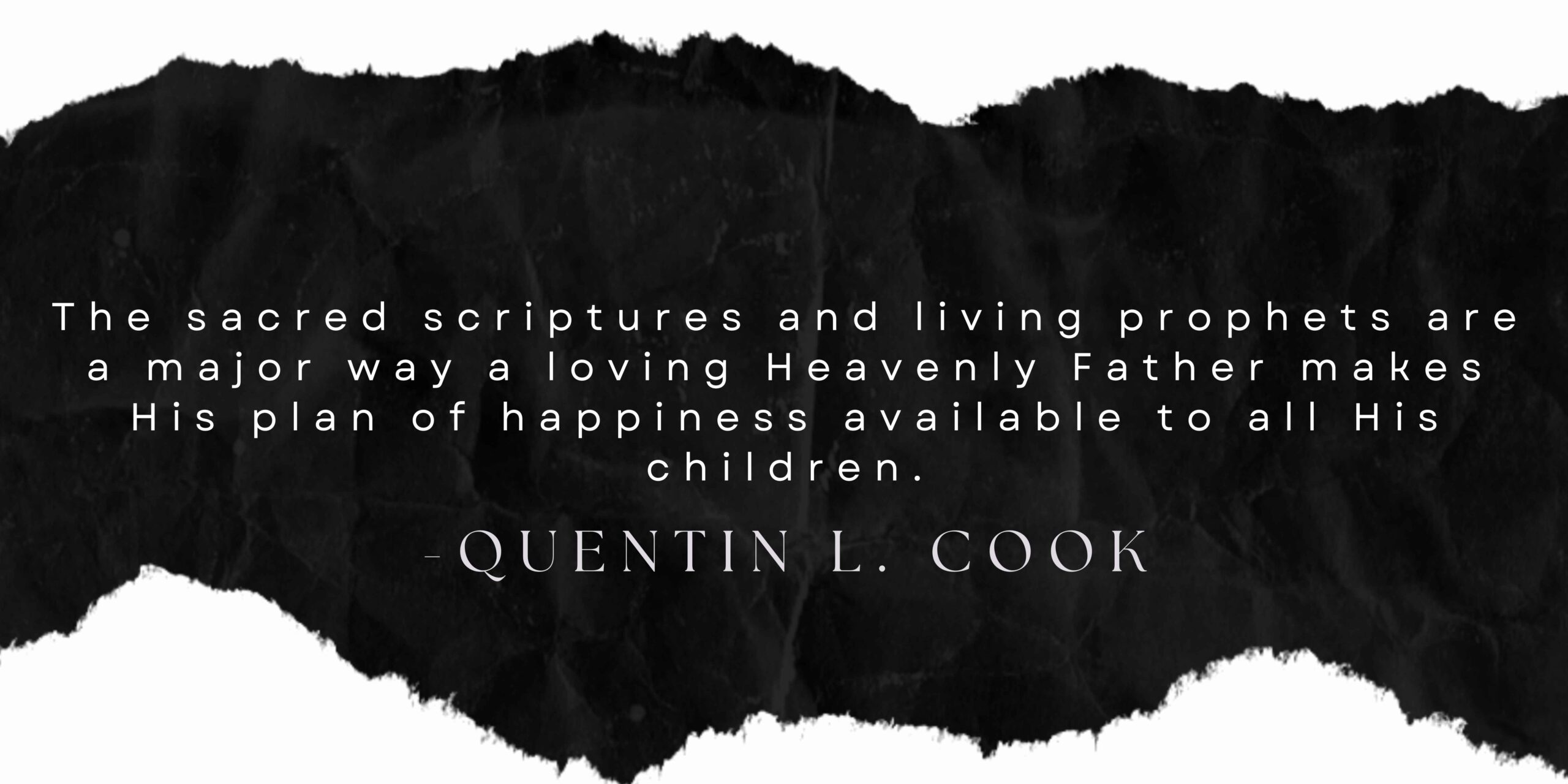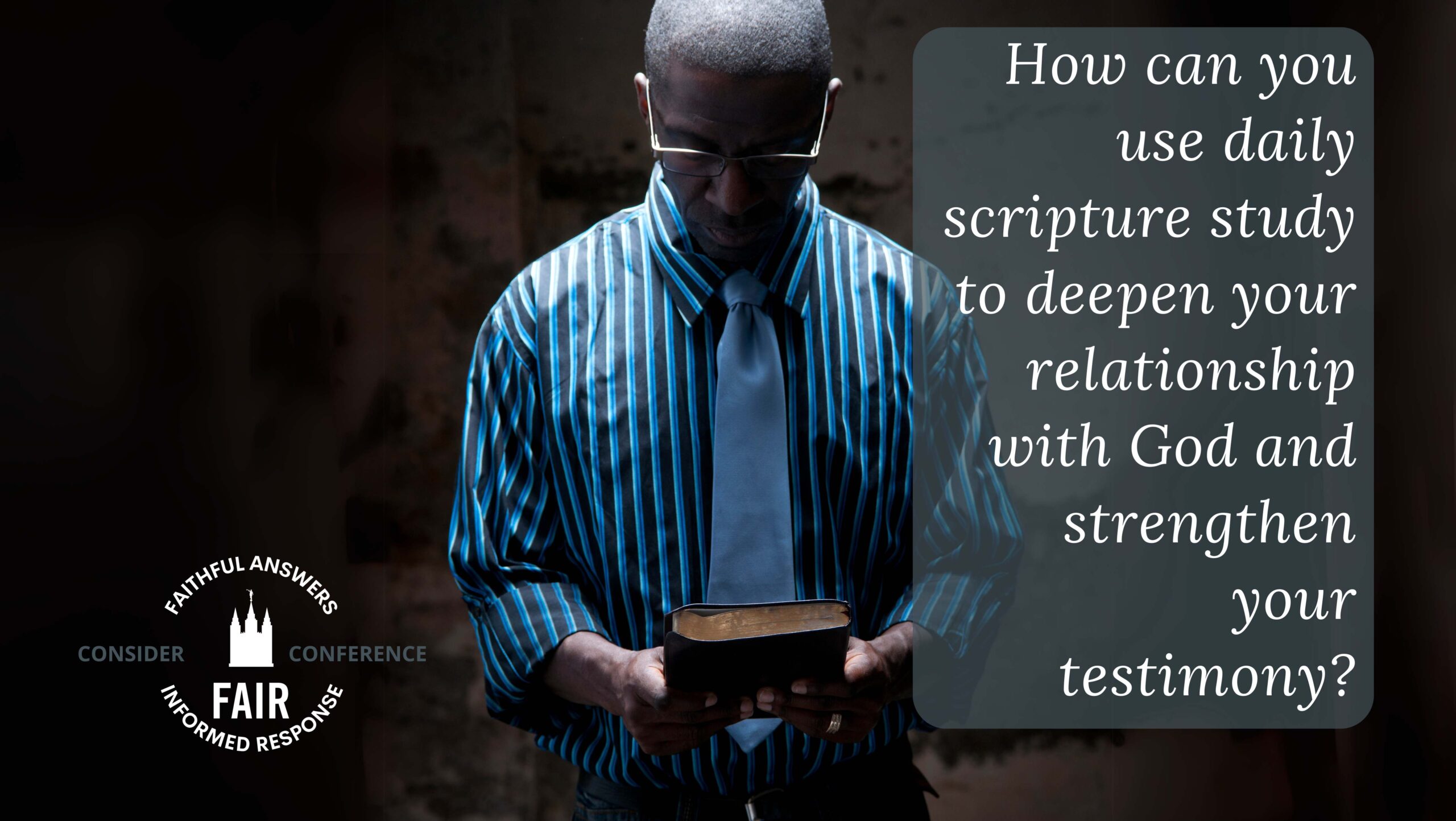
Have you ever considered that books, especially sacred scriptures, are the most enduring “handheld devices” in history?
Elder Quentin L. Cook, in his General Conference address Sacred Scriptures—the Foundations of Faith, highlights the eternal significance of sacred scriptures like the Bible and the Book of Mormon in providing divine guidance, comfort, and doctrinal clarity. He emphasizes their role in strengthening faith amidst modern challenges and the increasing digital noise of our era. Elder Cook’s reflections resonate deeply with those grappling with questions of faith, showing how scriptures can illuminate the path to truth and joy.
Questions, Misconceptions, and Criticisms
Doctrine
Question: “Are scriptures like the Bible and Book of Mormon still relevant in addressing modern-day challenges?”
Many people feel that ancient texts cannot provide meaningful guidance in our technology-driven, fast-paced world. They may perceive scriptures as outdated and disconnected from the realities of modern life.
Response: The scriptures contain timeless principles that address universal human struggles, such as forgiveness, resilience, and purpose. Together, the Bible and the Book of Mormon clarify essential doctrines, like the Atonement, and guide readers in making righteous choices amidst modern complexities.
Common Fallacies:
- Presentism Bias: Assuming ancient texts are irrelevant because they predate modern culture overlooks their enduring wisdom. Scriptures transcend time, offering insights into human nature and divine guidance.
- False Dichotomy: Believing ancient texts cannot inform modern challenges creates a false separation between past wisdom and present issues. Applying scripture enables us to adapt eternal truths to today’s world.
History
Criticism: “The Book of Mormon contradicts the Bible, undermining its claim to divine authenticity.”
Critics often claim that inconsistencies between the Bible and the Book of Mormon discredit the latter as scripture. This perspective leads some to dismiss the Book of Mormon’s divine origin.
Response: The Book of Mormon complements the Bible, fulfilling Ezekiel’s prophecy of the “sticks of Judah and Joseph” becoming one. It enhances biblical teachings by offering explicit insights, such as its detailed explanation of the Atonement, while upholding the Bible’s fundamental principles.
Common Fallacies:
- Strawman Argument: Misrepresenting the Book of Mormon as contradictory to the Bible ignores its purpose as a companion scripture. Together, these texts provide greater clarity.
- Confirmation Bias: Critics often focus solely on perceived inconsistencies without considering the overarching harmony between the two texts. A holistic study reveals their unity in teaching Christ’s gospel.

“The sacred scriptures and living prophets are a major way a loving Heavenly Father makes His plan of happiness available to all His children.” – Elder Quentin L. Cook
Apologetic Applications of Doctrine
Defending Divine Doctrines
Doctrine: The Role of the Book of Mormon in Testifying of Christ and Clarifying the Atonement
Elder Quentin L. Cook highlights the Book of Mormon’s explicit teachings about the Atonement of Jesus Christ as a critical complement to the Bible. The Book of Mormon clarifies key doctrines such as the balance between mercy and justice, Christ’s role in redemption, and the need for repentance. These teachings are central to a robust understanding of salvation and address common misconceptions about the necessity of Christ’s atoning sacrifice.
Here’s how this doctrine defends core beliefs:
- First defense: The Book of Mormon clarifies the Atonement by expanding on biblical teachings. For example, Alma 42 explains how God’s justice and mercy work together, showing the necessity of repentance and Christ’s atoning role. This detail enhances doctrinal clarity, making it clear why Christ’s sacrifice is essential for eternal life.
- Second defense: The Book of Mormon resolves confusion about the nature of Christ’s mission by explicitly teaching the eternal consequences of sin and the path to redemption. This doctrine strengthens faith by reinforcing God’s fairness and love in providing a Savior.
Application
How this teaching clarifies misunderstandings:
The Book of Mormon provides answers to questions about why a Savior is necessary and how repentance brings mercy. Its teachings clarify misconceptions, such as the idea that faith alone is sufficient without obedience or repentance.
Practical application:
Believers can use the Book of Mormon to address questions about Christ’s role in salvation by sharing passages such as Alma 42:13–15. Additionally, studying the Book of Mormon daily builds a deeper understanding of God’s plan, helping members explain their faith with confidence.
Historical and Doctrinal Connections
Contextual Background
Elder Quentin L. Cook connects the Book of Mormon to biblical prophecy, emphasizing Ezekiel’s declaration that the “stick of Judah” (the Bible) and the “stick of Joseph” (the Book of Mormon) would become one in God’s hand. This historical connection highlights the restoration of lost truths and the Lord’s consistent method of revealing His word across dispensations. Just as ancient prophets testified of Christ, the Book of Mormon amplifies those testimonies for modern readers, reinforcing the unity of God’s work through time.
Doctrinal Connections
This week’s Come Follow Me lesson (Doctrine and Covenants 2) discusses Elijah’s role in restoring priesthood keys to “turn the hearts of the fathers to the children.” Elder Cook’s focus on the Book of Mormon complements this theme by showcasing its role in uniting families in faith. The Book of Mormon’s teachings on Christ’s Atonement clarify how His sacrifice enables eternal family bonds and fulfills the promises made to the fathers. Through daily study, as Elder Cook emphasizes, individuals can better understand their divine role in God’s eternal plan.

Living Apologetics
Practical Application
Elder Quentin L. Cook’s counsel provides meaningful ways to integrate apologetic principles into daily life:
- Use Scripture to Build Faith: Share verses from the Book of Mormon that have strengthened your testimony. Emphasize how its teachings on Christ’s Atonement clarify essential doctrines and provide hope in times of doubt.
- Engage in Intentional Gospel Conversations: When questions arise about the Church or the Book of Mormon, approach these discussions with patience and love. Share personal experiences and spiritual insights that demonstrate the scriptures’ impact on your life.
Faith in Action
- Share a favorite scripture or quote from Elder Cook’s talk on social media, along with your personal testimony of its significance.
- Organize a small group discussion in your ward or family to explore how the Book of Mormon complements the Bible in teaching Christ’s gospel.
- Write a letter or send a message to someone struggling with faith, including a comforting scripture and a message of encouragement.
Application Ideas
- Dedicate 15 minutes daily to studying the Book of Mormon, focusing on how it testifies of Christ’s Atonement.
- Memorize a verse from the Book of Mormon each week and ponder how it applies to challenges you face.
- Keep a journal of insights gained from scripture study, noting how they strengthen your understanding of the gospel and aid in faith-promoting conversations.
Quick Reference: Key Defenses and Facts
Defensive Highlights
- The Role of Scriptures in Conversion: Scriptures, combined with the Holy Spirit, facilitate conversion by providing divine guidance and comfort.
- The Book of Mormon Complements the Bible: It fulfills biblical prophecy (Ezekiel 37) and clarifies doctrines like the Atonement of Jesus Christ.
- Daily Scripture Study Strengthens Faith: Immersing yourself in the scriptures daily invites the Spirit and protects against doubt and spiritual apathy.
Top Apologetic Facts
- Ezekiel 37 and the “Sticks” Prophecy: The Bible (stick of Judah) and Book of Mormon (stick of Joseph) were prophesied to unite, demonstrating divine harmony.
- Explicit Teachings on the Atonement: Alma 42 provides unparalleled clarity on justice, mercy, and Christ’s role in redemption.
- Historical Continuity of Prophets: Just as God guided ancient prophets, He continues to lead His children through modern revelation.
Conclusion
Elder Quentin L. Cook’s message reminds us that the scriptures are more than ancient texts—they are living tools for spiritual guidance, comfort, and strength in our modern lives. By immersing ourselves in the teachings of the Bible and the Book of Mormon, we invite the Spirit into our lives and fortify our faith against challenges. How can you use daily scripture study to deepen your relationship with God and strengthen your testimony?

“The sacred scriptures and living prophets are a major way a loving Heavenly Father makes His plan of happiness available to all His children.” – Elder Quentin L. Cook
Share your insight
Your thoughts and experiences can help others along their journey. Share them below, and let’s continue this conversation on sustaining the Savior’s light together.
The Consider Conference series by FAIR offers an in-depth look at recent General Conference talks to help members of the Church of Jesus Christ of Latter-day Saints navigate common questions, misunderstandings, and criticisms. Each post provides doctrinal insights, historical context, and practical ways to apply gospel principles in everyday conversations. Through this series, we hope to equip readers with faith-promoting resources that encourage thoughtful reflection, respectful dialogue, and a stronger foundation in gospel truths, fostering both personal conviction and meaningful discussions with others.
The post Sacred Scriptures: The Original Handheld Device of Faith and Guidance appeared first on FAIR.
Continue reading at the original source →



